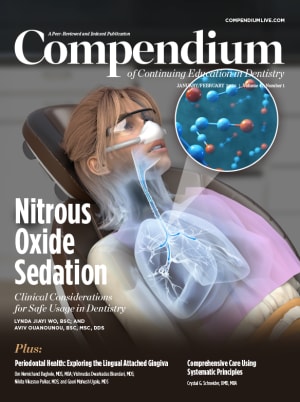Could Poor Oral Hygiene Increase the Risk of COVID-19 Infection?
Victoria Sampson, BDS, MFDS, RCS Ed
For years, the dental profession has known of the direct connection between the mouth and the body. This connection is mutual; when there is poor systemic health, the mouth often reacts with inflammation, xerostomia, periodontal disease, and increased decay. When patients take certain medications or undergo hormonal changes, the mouth reflects this. Furthermore, many nutritional deficiencies and gastrointestinal diseases are first diagnosed in the mouth, with many practitioners believing the mouth is an extension of the gastrointestinal tract.
As a result, when treating oral disease clinicians must consider the potential consequences on the body and/or whether the oral issues could have been caused by systemic disease instead. With the COVID-19 pandemic, it is especially important to treat patients holistically and reduce the levels of oral bacteria to maintain not only a healthy mouth, but also a healthy body.
One distinctive trait of the SARS-CoV-2 virus that was learned early on is that it seemed to particularly impact those with diabetes, high blood pressure, obesity, and/or heart disease. Also, the mean age of patients developing severe complications was 69 years old, with the elderly deemed more vulnerable to developing complications from COVID-19, includingacute respiratory distress syndrome, pneumonia, sepsis, septic shock, and blood clots.Patients are more likely to die from these post-viral complications as opposed to solely from COVID-19.1
This is not the first time a viral infection has caused complications that eventually result in death. In the influenza pandemic in 1918, the primary cause of death was not from the virus itself but from bacterial superinfections instead.HIV is another such example where a primary cause of death is bacterial pneumonia, not the actual virus.Despite the proven importance of superinfections in the severity of viral diseases, they are often understudied during respiratory infection outbreaks, as the diagnosis of a superinfection is complex and time consuming.Notwithstanding, studies have shown that 80% of patients in intensive care units (ICUs) with COVID-19 had an exceptionally high bacterial load and required antibiotics.2Furthermore, in Italy 84% of patients admitted into ICU for COVID-19 required antibiotics,3 supporting the idea that bacteria plays a huge role in the development and severity of COVID-19 infections.
While the medical community understands the idea of bacterial superinfections during a COVID-19 infection, virtually no consideration is given to the notion of this bacteria originating from the mouth. The four main comorbidities associated with an increased risk of complications and death from COVID-19-diabetes, high blood pressure, obesity, and heart disease-are also associated with altered oral biofilms and periodontal disease. Periodontopathic bacteria are implicated in systemic inflammation, bacteremia, and pneumonia.4-7 Patients exhibiting severe complications from COVID-19 also often display high levels of inflammatory markers (interleukin 2, 6, and 10),8 the same markers that are increased in patients suffering from periodontal disease.4 Furthermore, bacteria present in the metagenome of patients severely infected with COVID-19 included high levels of Prevotella intermedia, Staphylococcus aureus, and Fusobacterium nucleatum, all usually commensal organisms in the mouth.9
Oral bacteria are vulnerable to being aspirated into the respiratory tract and helping initiate or worsen conditions such as pneumonia or sepsis. Inadequate oral hygiene can, therefore, increase the risk of interbacterial exchanges between the lungs and mouth, allowing for respiratory infections and post-viral bacterial complications. COVID-19 patients experiencing severe complications who are in ICU or intubated on a ventilator may be unable to brush their teeth themselves. Ventilator-associated pneumonia and poor oral health when intubated are, fortunately, very avoidable. Numerous studies have shown that improved oral care can significantly reduce the incidence of ventilator-associated pneumonia in ICU patients and lower the risk of acquiring a bacterial superinfection.4-7,10,11
During this pandemic the importance of oral health and its connection to systemic health-as well as maintaining dental visits-must be emphasized to patients and the public. Oral hygiene must be sustained, if not improved, in order to reduce bacterial load in the mouth and, therefore, the potential risk of bacterial superinfection. Oral care is so important that one in 10 pneumonia-related deaths in the elderly could be prevented by improving oral hygiene.11
Dental professionals all have a responsibility to improve their patients' oral health not only in the chair, but also at home. Patients should know that oral health must be considered an utmost priority. It is in dentists' hands to reduce the bacterial load in the mouth and lower the potential risk of bacterial superinfections arising from a COVID-19 infection.
About the Author
Victoria Sampson, BDS,
MFDS, RCS Ed
Private Practice, London, England
